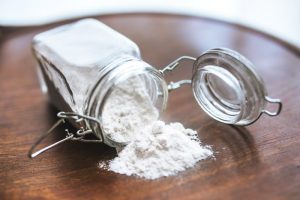 It can be frustrating to see your stainless steel appliance rusting, because it is supposed to be stainless, after all! Stainless steel rust is a puzzling concept, and to be honest, a better name for it is “Less Likely to Stain Steel.” Although it is more difficult to rust than regular steel, the main element of stainless steel is still…steel. The fact of the matter is that steel does rust. There are some steps you can take, however, to reduce or eliminate the risk of this happening. Rust is an iron oxide formed by the reaction of iron and oxygen in the presence of water or moisture. Whether you’re washing dishes or getting a glass of water from your refrigerator tap, much of what we do in the kitchen involves water. Not to mention, living in Florida in general can expose your appliances to moisture if you enjoy leaving the doors open on a nice day. That’s why stainless steel appliances are so popular – especially in The Sunshine State.
It can be frustrating to see your stainless steel appliance rusting, because it is supposed to be stainless, after all! Stainless steel rust is a puzzling concept, and to be honest, a better name for it is “Less Likely to Stain Steel.” Although it is more difficult to rust than regular steel, the main element of stainless steel is still…steel. The fact of the matter is that steel does rust. There are some steps you can take, however, to reduce or eliminate the risk of this happening. Rust is an iron oxide formed by the reaction of iron and oxygen in the presence of water or moisture. Whether you’re washing dishes or getting a glass of water from your refrigerator tap, much of what we do in the kitchen involves water. Not to mention, living in Florida in general can expose your appliances to moisture if you enjoy leaving the doors open on a nice day. That’s why stainless steel appliances are so popular – especially in The Sunshine State. Why Does Stainless Steel Rust?
The difference between steel and stainless steel is that stainless steel contains chromium. When exposed to oxygen, it forms a thin layer of chromium oxide which is invisible to the naked eye. This layer is what protects it from rust. So, if this layer is damaged and exposed to the elements, rust will form there. One unique and great feature of chromium oxide, however, is that it’s self-healing. With a little TLC, this damaged layer has the ability to revert back to its original state.
- Improper cleaning: When dirt isn’t removed properly or soap dries on the surface, it allows iron to react to the oxygen in the air.
- Scrubbing the surface with steel, wool or wire brushes: Not only are these tools much to harsh for stainless steel, but the particles can become embedded onto the surface and cause rust.
- Cleaning chemicals: Below you’ll see a list of chemicals you shouldn’t use on your stainless surface. Be cautious of cleaning other surfaces with these chemicals near your stainless steel appliances. For example, if you clean your floors with a product containing alcohol, the bottom of your refrigerator may suffer.
 How Can I Prevent My Stainless Steel from Rusting?
How Can I Prevent My Stainless Steel from Rusting?
Like other household items, proper upkeep and cleaning is what maintains your stainless steel appliance’s original condition. You should never use a steel or wool brush to clean the surface of your appliance, because these tool particles may adhere to the stainless and begin to rust. Because of its unique makeup, there are also quite a few products you should not use to clean stainless steel. It’s best to avoid products that contain:
Do Not Use:
- Fluorine
- Chlorine
- Bromine
- Iodine
- Alcohol
- Ammonia
- Mineral Spirits
It’s best to use a solution made with dish detergent and warm water to clean your appliances. Just make sure there are no soap particles left on the surface and that the surface is completely dry. You can also use a dependable and recommended stainless steel cleaner, like Cerama Bryte Stainless Steel Cleaner.
How Do I Remove Rust from My Stainless Steel Appliance?
 If you’ve found yourself in the position where your appliance has already rusted, you’re not out of luck quite yet. As long as you deal with it accordingly, you should be able to get it back to its original condition. Make a paste made with water and baking soda. Then, use a clean cloth or soft bristle brush to wipe the appliance, wiping in the same direction as the grain. Rinse with clean water, so the baking soda doesn’t dry onto the surface. Lastly, apply some stainless steel cleaner and wipe gently. Bar Keeper’s Friend also works to remove rust from stainless steel. If you opt for this method, be sure to only use the cream cleanser that is free of grit. Use a damp soft sponge and rub in the direction of the metal grain lines.
If you’ve found yourself in the position where your appliance has already rusted, you’re not out of luck quite yet. As long as you deal with it accordingly, you should be able to get it back to its original condition. Make a paste made with water and baking soda. Then, use a clean cloth or soft bristle brush to wipe the appliance, wiping in the same direction as the grain. Rinse with clean water, so the baking soda doesn’t dry onto the surface. Lastly, apply some stainless steel cleaner and wipe gently. Bar Keeper’s Friend also works to remove rust from stainless steel. If you opt for this method, be sure to only use the cream cleanser that is free of grit. Use a damp soft sponge and rub in the direction of the metal grain lines.
